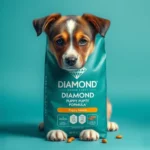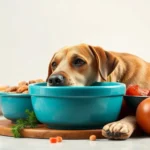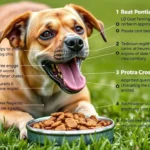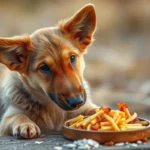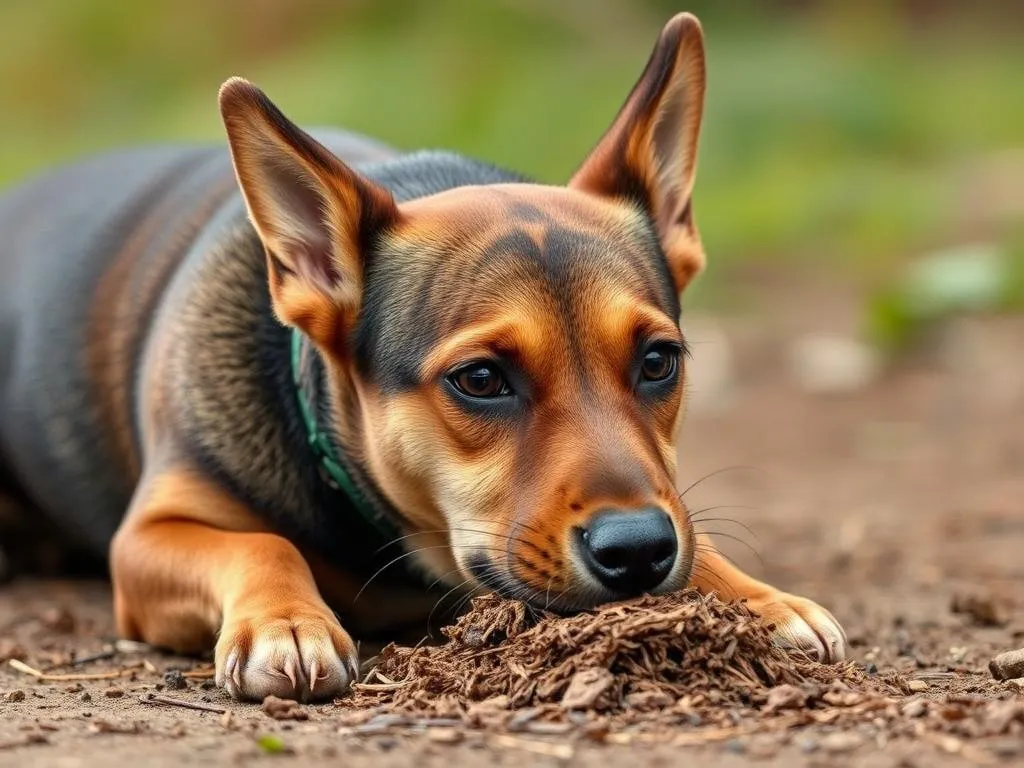
Introduction
Understanding dog nutrition is vital for every dog owner who wants to ensure their furry friends lead happy and healthy lives. A balanced diet is crucial, not only for maintaining optimal health but also for preventing behavioral issues. One peculiar behavior that often raises eyebrows among dog owners is coprophagia—the act of dogs eating feces, including that of rabbits. While it might seem strange, this behavior has various underlying reasons, and understanding them can help mitigate any potential health risks for your dog.
This article delves deep into the world of dog nutrition, exploring everything from the essential nutrients needed for a balanced diet to the reasons behind the curious habit of dogs eating rabbit poop. We will also discuss the potential health implications of this behavior, how to manage and prevent it, and when it might be necessary to consult a veterinarian.
Understanding Dog Nutrition
Basics of Canine Diet
A dog’s nutrition revolves around several essential nutrients that contribute to their overall health. The primary components of a dog’s diet include:
- Proteins: Crucial for growth, repair, and overall health. Proteins are made of amino acids, some of which are essential and must be obtained from food.
- Fats: A concentrated source of energy, fats also support cell growth, protect organs, and help absorb certain vitamins.
- Carbohydrates: While not strictly necessary, carbohydrates provide energy and aid digestion through fiber.
- Vitamins and Minerals: These are vital for various bodily functions, including immune response and bone health.
A balanced diet is imperative. It ensures that dogs receive the right proportions of these nutrients, promoting healthy growth, a shiny coat, and proper organ function.
Common Dog Food Types
When it comes to feeding dogs, there are several types of food available in the market, each with its advantages and disadvantages:
- Commercial Kibble: This is one of the most popular choices for dog owners due to its convenience and long shelf life. However, not all kibble is created equal; some brands use lower-quality ingredients.
- Wet Food: Often more palatable for dogs, wet food can provide moisture to their diet. However, it can be more expensive and has a shorter shelf life once opened.
- Raw Diets: Some owners opt for a raw food diet, believing it mimics a dog’s natural diet. While raw diets can be beneficial, they also require careful planning to ensure nutritional adequacy.
Understanding the pros and cons of each type is essential for making informed decisions about your dog’s diet.
Special Dietary Needs
Different dogs have varying dietary needs based on factors such as age, breed, and health conditions. Puppies require more calories and nutrients to support their rapid growth, while older dogs may need diets lower in calories but higher in fiber. Additionally, certain breeds may be predisposed to specific health issues that necessitate dietary adjustments.
Consulting a veterinarian can help tailor a diet that meets your dog’s unique needs, ensuring they remain healthy and active throughout their lives.
What is Coprophagia?
Definition and Overview
Coprophagia is the term used to describe the behavior of dogs eating feces. This behavior is not uncommon and can occur in various forms, including the consumption of their own feces or that of other animals, such as rabbits. While it may seem distasteful to humans, it is essential to differentiate between normal and abnormal behavior in dogs.
Some dogs may occasionally indulge in this behavior without any underlying issues, while others may do so more frequently, indicating potential nutritional deficiencies or behavioral problems.
Reasons Dogs Eat Rabbit Poop
There are several reasons why dogs might engage in the behavior of eating rabbit poop:
- Nutritional Deficiency: One significant reason could be a lack of certain nutrients in their diet. Rabbit feces may contain undigested nutrients that a dog instinctively seeks out.
- Instinctual Behavior: Dogs are descended from wild canines, which may have eaten feces as a survival tactic to obtain nutrients that were scarce in their environment.
- Curiosity and Exploration: Dogs naturally explore their surroundings with their mouths. The smell and taste of rabbit poop may pique their curiosity, leading them to sample it.
- Attention-Seeking Behavior: Sometimes, dogs may eat feces to get a reaction from their owners. If a dog notices that this behavior elicits a strong reaction—positive or negative—they may continue to do it for attention.
Understanding these motivations can help dog owners address the behavior more effectively.
Is Eating Rabbit Poop Harmful?
Potential Health Risks
While some dogs may eat rabbit poop without immediate consequences, there are potential health risks associated with this behavior. Rabbit feces can harbor parasites, bacteria, and viruses, which may pose a risk to your dog’s health. Common concerns include:
- Parasites: Dogs can contract intestinal parasites, such as roundworms or giardia, by consuming contaminated feces.
- Bacterial Infections: Consuming feces can expose dogs to harmful bacteria such as E. coli or Salmonella, which may lead to gastrointestinal issues.
The impact of eating rabbit feces on a dog’s digestive system can vary, but it is essential to monitor any changes in behavior or health after this occurrence.
Identifying Symptoms of Illness
If your dog has eaten rabbit poop, it’s vital to watch for any signs of illness. Symptoms to look out for include:
- Vomiting
- Diarrhea
- Lethargy
- Loss of appetite
- Signs of discomfort (e.g., whining, pacing)
If you notice any of these symptoms, it is crucial to consult a veterinarian to rule out any potential health issues.
How to Manage and Prevent Coprophagia
Training Techniques
If you’re dealing with a dog that has a habit of eating rabbit poop, training can be an effective way to manage this behavior. Here are some positive reinforcement techniques:
- Redirecting Attention: When you see your dog approaching rabbit feces, call them over or use a command such as “leave it” to redirect their focus.
- Reward Good Behavior: When your dog ignores the rabbit poop, reward them with treats or praise. This reinforcement helps establish a positive association with ignoring the feces.
Dietary Adjustments
Improving your dog’s diet can help reduce the urge to eat feces. Consider the following adjustments:
- High-Quality Food: Ensure your dog is eating a balanced, nutritious diet that meets their specific needs. Look for foods that are high in protein and contain wholesome ingredients.
- Supplements: If your dog has a known nutritional deficiency, consider incorporating supplements after consulting with your veterinarian.
Environmental Management
Preventing access to rabbit feces is another effective strategy. Here are some tips:
- Keep the Yard Clean: Regularly clean your yard of any rabbit droppings to eliminate the temptation for your dog.
- Use Barriers: If rabbits are frequent visitors, consider using fencing or barriers to keep them out of your yard.
- Leash During Walks: Keeping your dog on a leash can help you maintain control and prevent them from eating feces while out for walks.
When to Consult a Veterinarian
Signs of Serious Issues
If your dog’s behavior changes or if you notice any concerning symptoms, it may be time to consult a veterinarian. Behavioral changes such as increased anxiety, aggression, or lethargy can indicate underlying health issues.
Role of the Veterinarian in Nutritional Guidance
Veterinarians play a crucial role in ensuring your dog receives a balanced diet. They can help identify any nutritional deficiencies and recommend appropriate food or supplements. Regular health check-ups are essential for monitoring your dog’s health and adjusting their diet as necessary.
Conclusion
Proper dog nutrition is paramount for maintaining the health and well-being of your canine companion. Understanding behaviors like coprophagia, particularly why dogs eat rabbit poop, is equally important. By taking proactive steps to manage and prevent this behavior and ensuring a balanced diet, you can promote a healthier lifestyle for your dog. If you have concerns about your dog’s eating habits or overall nutrition, don’t hesitate to seek professional advice. Your furry friend deserves the best care you can provide.
FAQs (Frequently Asked Questions)
What should I do if my dog eats rabbit poop?
If your dog eats rabbit poop, monitor them for any signs of illness and consult your veterinarian if you notice any concerning symptoms.
Can rabbit poop be toxic to my dog?
While rabbit poop itself is not inherently toxic, it can carry parasites and bacteria that may pose health risks to your dog.
How can I tell if my dog has a nutritional deficiency?
Signs of nutritional deficiency can include poor coat condition, lethargy, and changes in appetite. A veterinarian can perform tests to identify specific deficiencies.
Are there specific dog breeds more prone to coprophagia?
While coprophagia can occur in any breed, certain breeds with strong scavenging instincts, such as hounds and terriers, may be more prone to this behavior.
